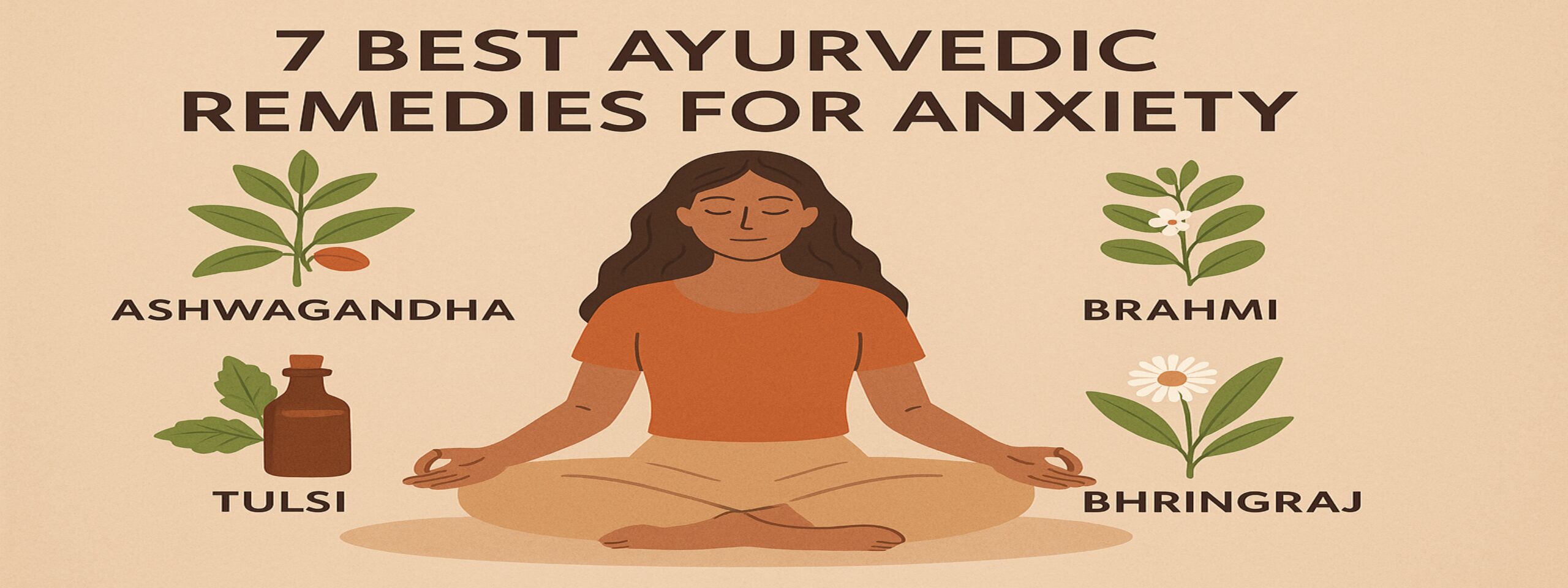Introduction: Understanding Anxiety Through Ayurveda
Anxiety isn’t just a modern-day problem — it’s a state of imbalance that Ayurveda recognized thousands of years ago. In Ayurvedic philosophy, anxiety arises when Vata dosha (the energy of movement and air) becomes aggravated, causing restlessness, fear, and insomnia.
Instead of suppressing symptoms, Ayurveda aims to heal the root cause by calming the mind, nourishing the nervous system, and restoring emotional harmony. Through herbal remedies, daily rituals, and mindful living, one can bring balance back to both body and mind.
Let’s explore the 7 best Ayurvedic remedies for anxiety that promote lasting peace and resilience.
1. Ashwagandha – The Stress-Relief Adaptogen
Ashwagandha (Withania somnifera) is one of the most well-known Ayurvedic herbs for anxiety and stress. It acts as an adaptogen, helping your body adapt to physical and emotional challenges.
How It Helps
- Reduces cortisol levels (the stress hormone)
- Promotes relaxation and better sleep
- Nourishes the nervous system and supports adrenal health
How to Use
Take 300–600mg of Ashwagandha extract daily or mix 1 tsp powder in warm milk before bed for calmness.
2. Brahmi – The Herb of Mental Clarity
Brahmi (Bacopa monnieri) has been used for centuries to enhance focus and reduce anxiety. It balances both Vata and Pitta doshas, strengthening the brain while calming the mind.
How It Helps
- Reduces racing thoughts and mental fatigue
- Improves memory and concentration
- Supports emotional stability
How to Use
Take 1–2 capsules of Brahmi extract daily or drink Brahmi tea to ease anxiety naturally.
3. Shankhpushpi – The Natural Tranquilizer
Shankhpushpi (Convolvulus pluricaulis) is often prescribed in Ayurveda for mental exhaustion, restlessness, and anxiety.
How It Helps
- Acts as a natural nervine tonic
- Improves sleep quality and relaxation
- Enhances serotonin levels for emotional balance
How to Use
Consume ½ teaspoon Shankhpushpi syrup or powder twice daily with warm water or milk.
4. Bhringraj Oil – For Calming the Mind Through Abhyanga (Massage)
Ayurveda emphasizes that touch therapy can deeply relax the nervous system. Abhyanga, the self-massage with warm herbal oils, is one of the most powerful remedies for anxiety.
How It Helps
- Activates the parasympathetic nervous system (rest-and-digest mode)
- Eases muscle tension and promotes emotional calm
- Balances Vata dosha, grounding the mind
How to Use
Warm Bhringraj or sesame oil, massage your scalp and feet before bed, and take a warm shower. This daily ritual promotes deep relaxation and better sleep.
5. Tulsi (Holy Basil) – The Sacred Stress Reliever
Known as the “Queen of Herbs,” Tulsi (Ocimum sanctum) holds a special place in Ayurveda for its powerful adaptogenic and spiritual properties.
How It Helps
- Reduces oxidative stress and anxiety symptoms
- Improves mood and immunity
- Promotes mental clarity and spiritual calmness
How to Use
Brew Tulsi tea 2–3 times daily or take Tulsi drops in warm water. Combining Tulsi with meditation amplifies its calming effect.
6. Jatamansi – The Root of Tranquility
Jatamansi (Nardostachys jatamansi) is a Himalayan herb revered for its deeply sedative and grounding qualities. It’s particularly beneficial for people with anxiety-induced insomnia.
How It Helps
- Acts as a natural antidepressant and relaxant
- Calms hyperactivity and restlessness
- Encourages deep, restorative sleep
How to Use
Mix ¼ tsp Jatamansi powder with honey or warm milk before bed. Alternatively, use Jatamansi essential oil in a diffuser for relaxation.
7. Meditation and Pranayama – The Breath of Peace
Beyond herbs, Ayurveda emphasizes mental discipline and breathwork to control anxiety. Practices like Anulom Vilom (alternate nostril breathing) and Nadi Shodhana clear energy channels, calm the mind, and regulate the nervous system.
How It Helps
- Reduces anxiety and panic attacks
- Balances Prana (life force)
- Promotes mindfulness and clarity
How to Practice
Sit comfortably, close one nostril, inhale through the other, switch sides, and exhale. Continue for 5–10 minutes daily for mental balance.
Conclusion: Restoring Calm the Ayurvedic Way
Ayurvedic anxiety remedies go beyond symptom relief—they transform how your mind and body handle stress. Herbs like Ashwagandha, Brahmi, and Tulsi nourish the nervous system, while daily rituals like oil massage and pranayama anchor you in peace.
By incorporating these remedies into your lifestyle, you can move from restlessness to resilience. Balance your doshas, calm your breath, and embrace the Ayurvedic path to serenity.
FAQs
1. How long does it take for Ayurvedic remedies to work for anxiety?
Most herbs show results within 2–4 weeks of consistent use, though full benefits may take longer depending on your dosha imbalance.
2. Can I take Ashwagandha and Brahmi together?
Yes. These two herbs complement each other — Ashwagandha reduces stress while Brahmi enhances mental clarity.
3. Are there any side effects of Ayurvedic anxiety remedies?
Generally safe when taken in recommended doses. However, consult an Ayurvedic practitioner if you’re on medications or have thyroid conditions.
4. Which dosha is responsible for anxiety?
Vata dosha imbalance is primarily linked to anxiety, characterized by fear, overthinking, and restlessness.
5. Can diet help reduce anxiety in Ayurveda?
Yes. Favor warm, grounding foods like ghee, milk, and cooked grains while avoiding caffeine and cold, dry foods that aggravate Vata.

